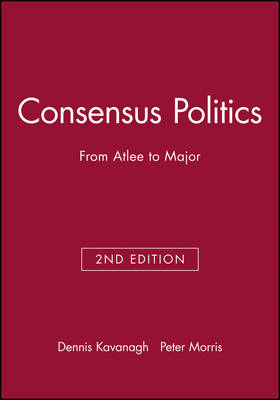Making Contemporary Britain
3 total works
British politics from the end of the Second World War until the rise of Thatcherism was characterized by the practice of consensus - that administrations of different political complexions were committed to certain continuities and a shared sense of purpose in policy and political approach. In 1979 Margaret Thatcher proclaimed that "It must be a conviction government" - a view incompatible with consensus as a style of governing - and set about challenging the shared assumptions of the previous three decades in order to destroy the notion of consensus. Dennis Kavanagh and Peter Morris chronicle the rise and fall of the post-war consensus in five key policy areas - the mixed economy, full employment, trade unions, welfare and foreign policy - to provide a introduction to one of the major debates of recent political history.
Margaret Thatchera s departure from office and the arrival of her successor, John Major, have had a profound impact on the way Britain is governed -- and in this new edition of Consensus Politics, the authors examines the legacy of Thatcherite "conviction politics" and assesses the state of consensus in Britaina s government today. This chronicle of the rise and fall of the post--war consensus in five key policy areas -- the mixed economy, full employment, trade unions, welfare and foreign policy -- remains a superb introduction to one of the major debates of recent political history.
Now in its second edition, this account of consensus politics has been updated to include a new chapter on John Major's premiereship. Dennis Kavanagh and Peter Morris chronicle the rise and fall of the post-war consensus in five key policy areas - the mixed economy, full employment, trade unions, welfare and foreign policy - to provide a succinct introduction to one of the major debates of recent political history.

